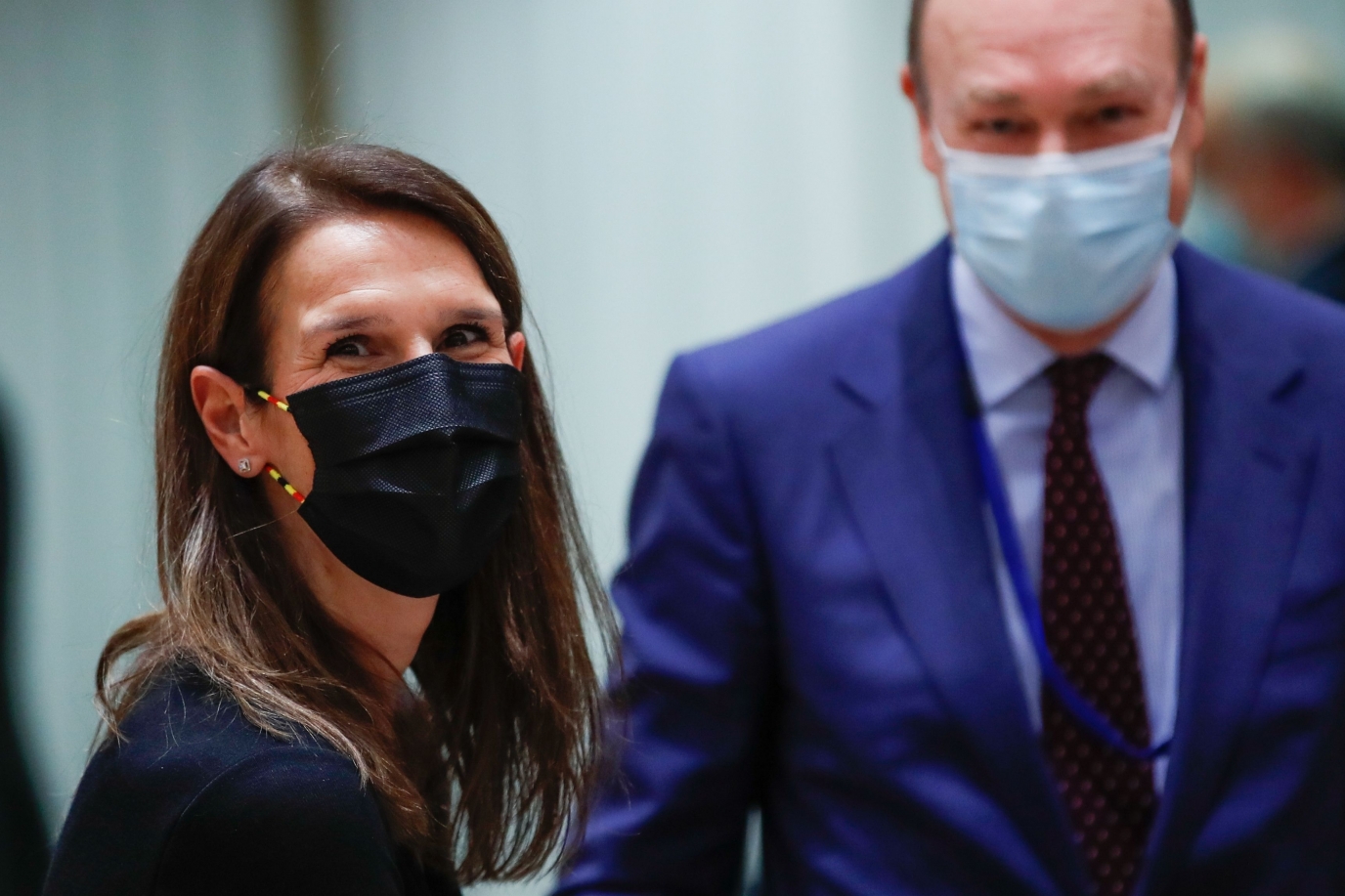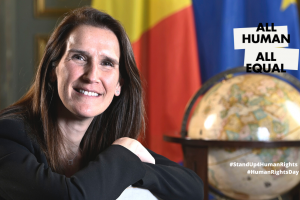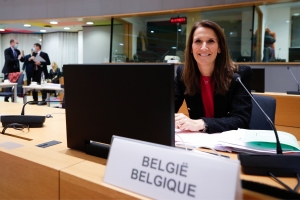Council of European Foreign Affairs Ministers of 13 December: Conclusions
On Monday 13 December, the Deputy Prime Minister and Minister for Foreign Affairs, Sophie Wilmès, met with her European counterparts in Brussels for a Foreign Affairs Council (FAC).
Energy geopolitics
Before the Foreign Affairs Council, a meeting was organised by Belgium on the geopolitical aspect of energy in the presence of Dr Fatih Birol, Executive Director of the International Energy Agency (IEA). The discussion focused on the external dimension of the energy crisis and the geopolitical aspects of energy.
"It is essential that Europe, which is a leader in the energy transition, uses diplomacy in full to convince the other players of the importance of this transition. Energy and geopolitics are closely related and it is crucial to pay attention to our energy dependency with regard to other political players. Furthermore, it is also important to remain attentive to any possible new dependencies, for example for minerals such as lithium and cobalt. Therefore, it is vital that the EU focuses on diversifying sources and strengthening resilience in the energy field," declared Sophie Wilmès.
EU-Africa relations
The Council also had a strategic discussion on relations between the EU and Africa in light of the EU-Africa summit in February. As the Minister indicated at the ministerial meeting in Kigali, tangible results should be obtained there. For our country, the summit should recall our attachment to common values such as good governance, the Rule of Law and the fight against corruption, and our commitment to complying with them.
Furthermore, the COVID-19 vaccination continues to be of utmost importance. "Belgium has committed to distributing 9 million doses via COVAX by 2021, which represents half of the vaccines administered in Belgium to date. The EU must also continue efforts to improve the COVAX mechanism and speed up vaccine deliveries, support their local production, and also their effective administration," declared Sophie Wilmès.
Ukraine
The European Foreign Ministers also discussed the strong presence of Russian troops and military equipment on Ukraine's borders. In the same way as the European Commission, the Council confirmed its support for Ukraine's territorial integrity and sovereignty. The EU's Foreign Ministers also agreed that a strong EU response would be necessary in the event of aggressive and ill-intended acts. The European Council will discuss the matter later this week.
For Belgium, de-escalation is the top priority. All diplomatic communication channels must be used to that end. Also, the EU should clearly announce the price that Moscow would pay in the event of an attack and, along with its international partners, be prepared to act swiftly if necessary. However, all this without becoming caught up in a negative spiral that might prevent all dialogue.
Belarus
Following the adoption of a fifth package of sanctions at the FAC of 15 November (adopted officially on 2 December), the Council again re-examined the subject of irregular migration from Belarus to the EU. Between 10,000 and 15,000 migrants are still believed to be in the border zone in appalling humanitarian conditions. For our country, the manipulation of thousands of migrants is shameful and unacceptable and it is essential that humanitarian organisations are allowed access to the border zone.
For Belgium, everything should be done to ensure that the regime commits rapidly to genuine political dialogue and agrees to hold free elections. The sanctions adopted up until now aim to encourage President Lukashenko to move in this direction.
Meeting with the Qatari Foreign Minister
The EU's Foreign Ministers also had a discussion with H.E. Sheikh Mohammed bin Abdulrahman Al Thani, Qatar's Deputy Prime Minister and Foreign Minister. Through the voice of its Deputy Prime Minister, our country expressed its support for the European Union's wish to intensify its relations with the countries of the Gulf Cooperation Council, including Qatar, in fields such as green energy, human rights, security and regional dialogue.
As she did at their meeting in New York on the margins of the United Nations General Assembly, Deputy Prime Minister Wilmès again thanked her counterpart for Qatar's decisive support in the Kabul evacuation operations. She also shared her concern about the current situation in Afghanistan: "Human rights in Afghanistan, especially those of women and girls, are not respected and the humanitarian situation is particularly serious. Aid is urgently required to meet the fundamental needs of the Afghan people as winter approaches."
Finally, the Foreign Ministers also discussed the forthcoming World Cup in Qatar and concerns relating to workers' rights. Belgium continued to encourage Qatar to make all necessary efforts.
Ethiopia
While discussing "current affairs", the Council also considered the situation in Ethiopia which remains very volatile. Irrespective of the evolution of the military balance of power, an unconditional and immediate ceasefire is Belgium's top priority. Focus is placed on respecting Ethiopia's territorial integrity, the accountability of all stakeholders, including the TPLF and other militia, immediate access to humanitarian aid and the rejection of attempts to seize power by force.
"To ensure long-term stability in Ethiopia, it is necessary to continue the fight against impunity and reconciliation. The warring parties are responsible for protecting the civilian population. Our country also continues to advocate the use of the EU's global human rights sanctions regime against individuals from all sides who continue to commit serious human rights' violations," declared Sophie Wilmès.
Central Asia
The Council also considered Central Asia in order to identify the EU's commitment priorities in the region. The last ministerial meeting between the EU and Central Asia in Dushanbe on 22 November showed the interest of the region's partners in closer cooperation with the EU.
"The EU has strong interests in Central Asia in view of the region's geostrategic location, its key role in Europe-Asia connectivity, its major energy resources, its rising market potential and the security aspect, as the Afghan crisis again reminded us. In view of the role played by other regional and global players in this region and in light of the growing interdependence and the devastating impact of the COVID-19 crisis, our country is convinced that the EU has an important role to play in Central Asia," declared Sophie Wilmès.
Venezuela
The EU's Ministers also discussed the situation in Venezuela following the regional and local elections held on 21 November. The Council received a report from Isabel Santos, Head of the EU's electoral observation mission. Belgium welcomes the work of the mission and the assessment of the initial findings. For our country, the recommendations should contribute to guaranteeing that democratic elections are held in the future.
Approval of the sanctions framework for Mali
In the frame of the monitoring of the coup d’état in Mali on 24 May and in view of the lack of progress towards a democratic transition, the Council also decided to adopt a new framework of restrictive measures which will enable the EU to impose sanctions on people or entities which threaten the peace, security or stability in Mali, or which jeopardise its democratic transition.
The Council also decided to introduce sanctions against the Wagner group, a private military firm based in Russia. The restrictive measures target the group itself as well as eight people and three entities associated with it. They are sanctioned in the frame of four different sanction regimes: the EU human rights global sanctions regime and the regimes related to the situation in Libya and Syria, as well as for actions violating Ukraine's territorial integrity.



